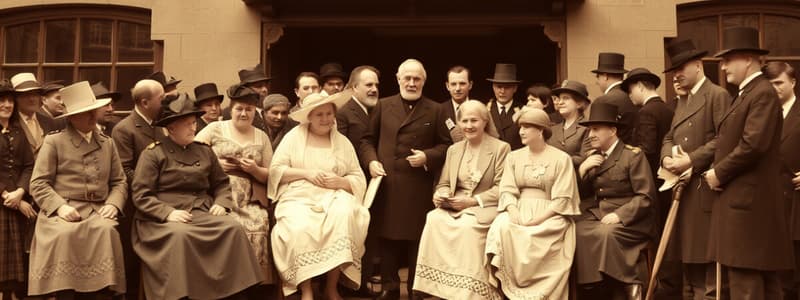Podcast
Questions and Answers
Who became king in 1901?
Who became king in 1901?
- Victoria
- Henry VIII
- Edward VII (correct)
- George V
Which act was passed in 1908?
Which act was passed in 1908?
- Education Act
- Old-Age Pensions Act (correct)
- Factory Act
- National Insurance Act
The suffragette movement was marked by peaceful protests.
The suffragette movement was marked by peaceful protests.
False (B)
What was a significant consequence of the political divisions within the Liberal Party?
What was a significant consequence of the political divisions within the Liberal Party?
The first Nobel Prizes were awarded in _____ .
The first Nobel Prizes were awarded in _____ .
What new role did women take on during the Edwardian period?
What new role did women take on during the Edwardian period?
Which scientific theory was published by Albert Einstein in 1905?
Which scientific theory was published by Albert Einstein in 1905?
The economic changes during the Edwardian period had no impact on literature.
The economic changes during the Edwardian period had no impact on literature.
What does the speaker in 'The Man He Killed' struggle with?
What does the speaker in 'The Man He Killed' struggle with?
Pablo Picasso started _____ between 1907 and 1911.
Pablo Picasso started _____ between 1907 and 1911.
Flashcards are hidden until you start studying
Study Notes
The Edwardian Age
- Edward VII's reign began in 1901, marking the start of the Edwardian period, characterized by significant social, political, and cultural changes.
- Liberal government enacted reforms like the 1908 Old-Age Pensions Act and the 1911 National Insurance Act, amidst divisions that spurred the rise of the Labour Party.
- Key political issues included the Irish question, women's suffrage, and the economic competition from the United States and Germany.
- The Easter Rising in Ireland and the suffragette movement highlighted the era's sociopolitical tensions.
- Although the British Empire expanded, it faced challenges from the economic ascendance of the U.S. and Germany, contributing to the causes of World War I.
Social Changes and Cultural Context
- The transition from Victorian stability to modernity was marked by changing roles for women and the lead-up to World War I.
- The end of the Edwardian period ushered in the Belle Époque and the Roaring Twenties, which brought glamour and the Great Depression.
- Literature and poetry from this era reflect indulgence in cuisine, fashion, and leisure activities, indicative of changing societal norms.
Literary Developments
- The Edwardian literary period is considered to stretch from 1901 to approximately 1910, with opinions varying on whether it continued until 1912 or 1918.
- Noteworthy milestones include the first Nobel Prizes awarded in 1901 and breakthroughs in fields such as psychology, physics, and art.
- Key literary influences consisted of:
- The first congress on Freudian psychology in 1908.
- The birth of cubism by Pablo Picasso between 1907 and 1911.
- Albert Einstein's theory of relativity published in 1905.
- The Wright brothers' first powered flight in 1908.
Societal Reflections in Literature
- A more critical view of authority emerged in literature, contrasting the earlier Victorian approach.
- Women's issues and the voices of the poor became prominent themes, breaking from traditional narratives.
- Moral conduct and prudery diminished in importance within literary works, reflecting broader societal changes.
- There was a growing awareness of human rights, further influencing writers' perspectives.
Attitude of the Speaker in "The Man He Killed"
- The speaker exhibits a conflicted attitude, grappling with the senselessness of war and rationalizing his actions.
- The tone is conversational and introspective, providing insight into the speaker's inner turmoil.
- Simple, colloquial language enhances the relatability and emotional depth of the reflections, grounding the speaker's voice in everyday experience.
Studying That Suits You
Use AI to generate personalized quizzes and flashcards to suit your learning preferences.




